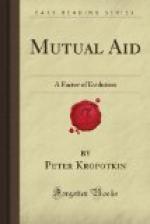The very peacefulness of the barbarians, certainly not their supposed warlike instincts, thus became the source of their subsequent subjection to the military chieftains. It is evident that the very mode of life of the armed brotherhoods offered them more facilities for enrichment than the tillers of the soil could find in their agricultural communities. Even now we see that armed men occasionally come together to shoot down Matabeles and to rob them of their droves of cattle, though the Matabeles only want peace and are ready to buy it at a high price. The scholae of old certainly were not more scrupulous than the scholae of our own time. Droves of cattle, iron (which was extremely costly at that time(3)), and slaves were appropriated in this way; and although most acquisitions were wasted on the spot in those glorious feasts of which epic poetry has so much to say—still some part of the robbed riches was used for further enrichment. There was plenty of waste land, and no lack of men ready to till it, if only they could obtain the necessary cattle and implements. Whole villages, ruined by murrains, pests, fires, or raids of new immigrants, were often abandoned by their inhabitants, who went anywhere in search of new abodes. They still do so in Russia in similar circumstances. And if one of the hirdmen of the armed brotherhoods offered the peasants some cattle for a fresh start, some iron to make a plough, if not the plough itself, his protection from further raids, and a number of years free from all obligations, before they should begin to repay the contracted debt, they settled upon the land. And when, after a hard fight with bad crops, inundations




